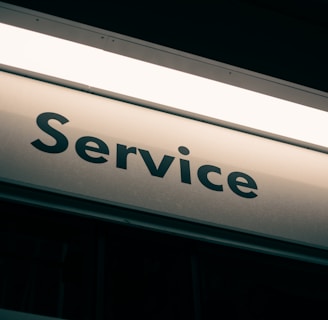Regular Preventative Auto Maintenance
Regular preventative auto maintenance is essential for keeping your vehicle in top condition and ensuring a safe and enjoyable driving experience. Here are some of the key benefits:
Extended Vehicle Lifespan: By addressing potential issues before they become major problems, preventative maintenance can significantly extend the lifespan of your vehicle.
Improved Fuel Efficiency: Well-maintained vehicles often have better fuel economy, saving you money at the pump.
Enhanced Safety: Regular checks of brakes, tires, lights, and other critical components help to ensure your vehicle is safe to drive.
Reduced Cost of Repairs: Early detection of minor issues can prevent them from escalating into more costly repairs.
Increased Resale Value: A well-maintained vehicle is generally worth more when it comes time to sell.
Peace of Mind: Knowing that your car is in good working order can provide peace of mind and reduce the stress of unexpected breakdowns.


Airport Tire offers comprehensive maintenance services to ensure your vehicles operates reliably for a long time to come. Contact is today to schedule your next inspection. While we wait for your call, why not go over some of the most most important aspect of preventative maintenance for your vehicle.


Regular oil changes are a cornerstone of preventative auto maintenance. They help to ensure optimal engine performance, fuel efficiency, and longevity. Fresh oil effectively lubricates engine components, reducing friction and wear. This not only prevents costly engine repairs but also helps to maintain the vehicle's resale value. Additionally, regular oil changes can help to prevent engine overheating and other performance issues.
The average oil change mileage varies depending on factors such as the type of oil, driving conditions, and the manufacturer's recommendations. Generally, modern vehicles with synthetic oils can often go between 5,000 and 7,500 miles between oil changes. However, older vehicles or those subjected to harsh driving conditions may require more frequent changes:
Check your owner's manual: Always consult your vehicle's owner's manual for the specific recommended oil change intervals.
Driving conditions: Factors like frequent short trips, heavy towing, or driving in extreme temperatures can shorten oil life.
Oil type: Synthetic oils generally last longer than conventional oils.
Oil quality: Using high-quality oil and filters is essential for engine health.
Warning lights: If your vehicle's check engine light or oil pressure warning light comes on, it's important to have your oil levels and condition checked.
Oil Changes


Brake inspections are a vital part of any preventative maintenance routine. They involve checking the condition of brake pads, rotors, calipers, and other components to ensure they are functioning properly. Regular inspections can help to identify potential issues early on, preventing them from escalating into more serious problems.
Brake replacements become necessary when brake pads or rotors wear down to a critical level. Worn brake components can compromise your vehicle's braking ability, potentially leading to accidents. It's important to replace worn brake components promptly to maintain your vehicle's safety.
Signs that your brakes may need inspection or replacement include:
Grinding or squealing noises: These sounds often indicate worn brake pads.
Vibrations or pulsing in the steering wheel: This can be a sign of warped rotors.
Longer stopping distances: If your vehicle takes longer to stop than usual, it may be a sign of worn brakes.
Brake warning light: If your vehicle's brake warning light illuminates, it's important to have your brakes checked immediately
Brake Inspections and Replacements


Regular checks and replacements of various fluids are essential for the proper functioning of your vehicle.
Common fluids that require regular checks and replacements include:
Engine oil: As discussed earlier, regular oil changes are vital for engine performance.
Coolant: Coolant helps to regulate engine temperature and prevent overheating. It should be checked and replaced according to the manufacturer's recommendations.
Transmission Fluid: Transmission fluid lubricates and cools the transmission components. It should be checked and replaced at the recommended intervals.
Brake fluid: Brake fluid helps to transmit hydraulic pressure to the brakes. It should be checked and replaced as needed to ensure proper braking performance.
Power Steering Fluid: Power steering fluid assists in steering the vehicle. It should be checked and replaced as recommended by the manufacturer.
Windshield Washer Fluid: Windshield washer fluid is used to clean the windshield. It should be refilled as needed.
Signs that a fluid may need to be checked or replaced include:
Fluid leaks: Look for evidence of fluid leaks, such as puddles under your vehicle
Unusual noises: Unusual noises from the engine, transmission, or other components could indicate a fluid-related issue.
Performance problems: If your vehicle is experiencing performance issues, such as difficulty starting, it could be due to a fluid problem.
Fluid Checks and Replacements
Battery Checks and Replacements
Regular battery checks and replacements are crucial components of a vehicle maintenance plan for several reasons:
Safety: A weak or dead battery can lead to unexpected engine shutdowns, especially in cold weather or when starting the vehicle after a long period of inactivity. This can pose a safety hazard, particularly while driving.
Performance: A healthy battery ensures optimal performance of the vehicle's electrical systems, including headlights, power windows, and audio equipment.
Fuel Efficiency: A battery in good condition contributes to efficient fuel consumption.
Cost Savings: Replacing a battery before it fails completely can save money in the long run, as unexpected repairs caused by a dead battery can be costly.
Recommendations:
Regular Checks: Have your vehicle's battery checked at least twice a year, especially before winter.
Replacement: Replace the battery when it shows signs of weakness, such as difficulty starting the engine, dimming headlights, or a warning light on the dashboard.
Quality Battery: Invest in a high-quality battery that is compatible with your vehicle's make and model.


Ready to Roll?
